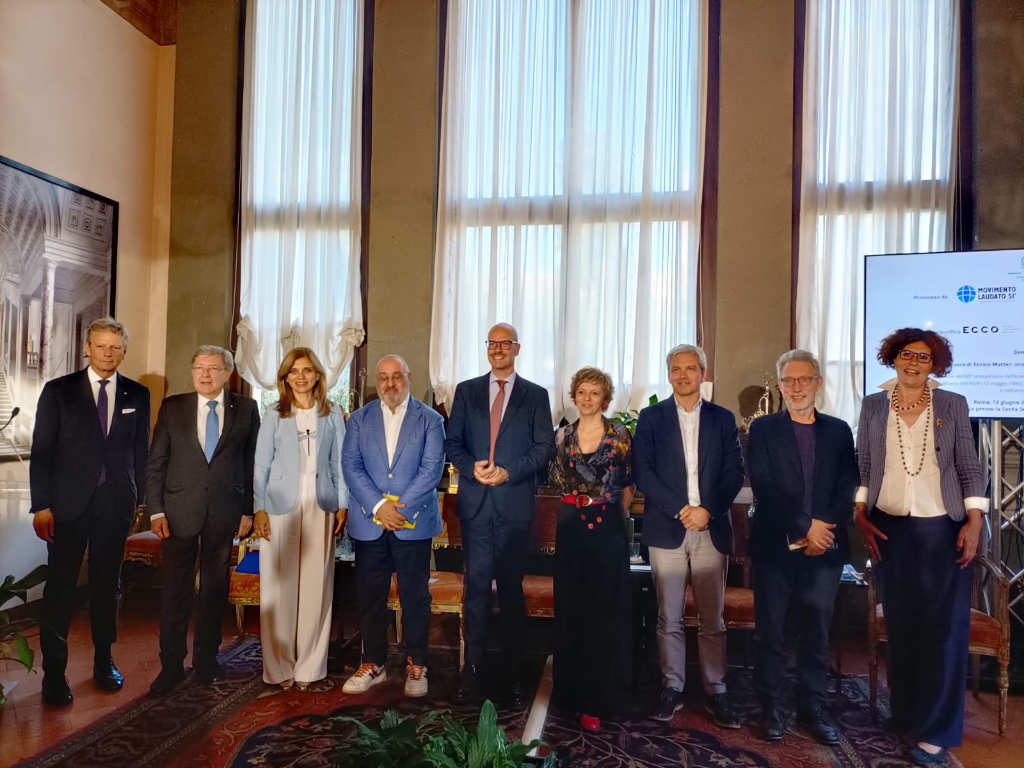
Matteo Leonardi, Co-Founder and CEO of ECCO
“Beyond hope, what we need is not to resign ourselves to inertia, as Matteo Leonardi also recalled. We come from decades of inertia on a whole series of issues, and we also need to recover that desire to change in the short term. Because it is true that choosing the future is important, but it is even more important to create a different future, a future that is within our reach – we still hope – and on which perhaps each one of us should reflect much more in order to decide what we want to achieve, and to achieve it for everyone and quickly. Because, as they say: if you don’t take care of the future, the future will take care of you… and at this stage, that’s not necessarily good news.”
– Enrico Giovannini, Chief Scientific Officer, ASviS
This message of urgency and hope resonated strongly at the recent meeting held at the Italian Embassy to the Holy See. European Catholic organizations active in Africa shared how they have learned from African leaders who have succeeded in turning the message of Laudato Si’ into hope, resilience and concrete action.
It was not just another commemoration, nor was it a forum for analysis. As Cecilia Dall’Oglio of the Laudato Si’ Movement rightly expressed: “It was a process, not just an event. A space where the Gospel of creation comes face to face with the challenges of our time, especially in the most vulnerable communities.
Andrea Atzori, of Doctors with Africa (CUAMM), recalled that in the midst of poverty and the climate crisis, Laudato Si’ guides with compassion and structural commitment. Rural communities are not beneficiaries, but protagonists of change.
From AVSI, Maria Laura Conte offered us a luminous image: how the arrival of clean energy in a small Rwandan village transformed the community dynamics. Because the care of creation is not a parallel task to development, it is the soul of any process that wants to be truly human.
VIS (International Volunteerism for Development), represented by its president Michela Vallarino, insisted on the need to train African youth – who will make up 40% of the world’s young population in 2030 – in technical skills, environmental awareness and critical thinking. In addition, the organizations that cooperate with them should also be trained, so that sustainability becomes a cross-cutting theme in all their actions.
The call for a paradigm shift was particularly forceful in the voice of Carmelo Troccoli of Coldiretti, who denounced how export agriculture imposed by global interests has replaced essential crops such as corn, forcing them to even import their own staple food. “Innovation only makes sense if it generates useful change for them, not just for us.”
From Mozambique, the Community of Sant’Egidio and its DREAM HIV/AIDS program reiterated that cooperation must be holistic and long-term. In every service, we must put the person at the center, with his or her social, cultural and spiritual needs.
In a vibrant final intervention, Ivana Borsotto of FOCSIV invited us to break with the “muscular model” of international relations, marked by fear and extractive logic. She urged us to embrace a more courageous cooperation, inspired by justice, democracy and real openness to change.
And then came Professor Giovannini. With his clarity and strategic vision, he took us beyond the conjuncture. Beyond the data. Beyond even hope. He spoke to us of time. Of urgency. Of that holy anger that, according to some, Pope Francis felt because “we are not moving at the speed that the situation requires”.
The message was strong: the ecological transition is urgent. A different future is possible as long as we detonate actions and build the future for all.

From the Laudato Si’ Movement, we listen to this call with attentiveness. It inspires us to continue promoting an integral ecological conversion that transforms both systems and hearts.
We continue to walk alongside those who tread the red earth of Africa, listen to the cry of the poor and the earth, and choose to act with courage and hope.





